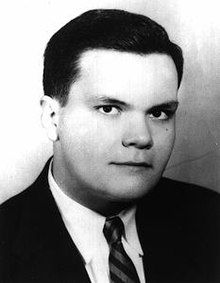This article relies largely or entirely on a single source. (March 2020) |
John Kennedy Toole | |
|---|---|
 | |
| Born | December 17, 1937 New Orleans, Louisiana, U.S. |
| Died | March 26, 1969 (aged 31) Biloxi, Mississippi, U.S. |
| Occupation | Author |
| Education | Tulane University (BA) Columbia University |
| Notable works | A Confederacy of Dunces (1980) |
| Notable awards | Pulitzer Prize (1981) |
John Kennedy Toole (/ˈtuːl/; December 17, 1937 – March 26, 1969) was an American novelist from New Orleans, Louisiana, whose posthumously published novel, A Confederacy of Dunces, won the Pulitzer Prize for Fiction in 1981; he also wrote The Neon Bible. Although several people in the literary world felt his writing skills were praiseworthy, Toole's novels were rejected during his lifetime. Due in part to these failures, he suffered from paranoia and depression, dying by suicide at the age of 31.
Toole was born to a middle-class family in New Orleans. From a young age, his mother, Thelma, taught him an appreciation of culture. She was thoroughly involved in his affairs for most of his life, and at times they had a difficult relationship. With his mother's encouragement, Toole became a stage performer at the age of 10 doing comic impressions and acting. At 16 he wrote his first novel, The Neon Bible, which he later dismissed as "adolescent".[1]
Toole received an academic scholarship to Tulane University in New Orleans. After graduating from Tulane, he studied English Literature at Columbia University in New York while teaching simultaneously at Hunter College. He also taught at various Louisiana colleges, and during his early career as an academic he was valued on the faculty party circuit for his wit and gift for mimicry. His studies were interrupted when he was drafted into the army, where he taught English to Spanish-speaking recruits in San Juan, Puerto Rico. After receiving a promotion, he used his private office to begin writing A Confederacy of Dunces, which he finished at his parents' home after his discharge.
Toole submitted A Confederacy of Dunces to publisher Simon & Schuster, where it reached editor Robert Gottlieb. Gottlieb considered Toole talented but felt his comic novel was essentially pointless. Despite several revisions, Gottlieb remained unsatisfied, and after the book was rejected by another literary figure, Hodding Carter Jr., Toole shelved the novel. Suffering from depression and feelings of persecution, Toole left home on a journey around the country. He stopped in Biloxi, Mississippi where he committed suicide by running a garden hose in from the exhaust of his car to the cabin. After his death, his mother brought the manuscript of A Confederacy of Dunces to the attention of novelist Walker Percy, who was crucial in the book's publication. In 1981, Toole was posthumously awarded the Pulitzer Prize for Fiction.